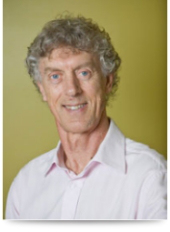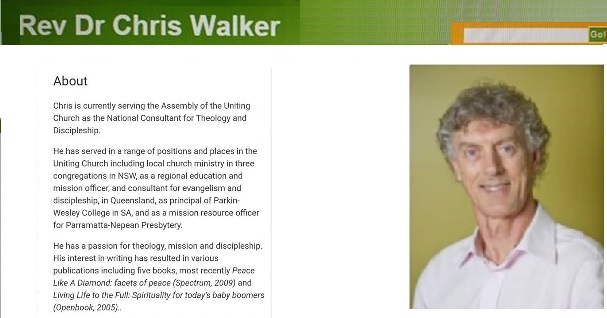with Rev Dr Chris Walker

Healthy Living
Amantha Imber has a helpful science-backed book, The Health Habit. She deals with sleep, movement and nutrition in the first half of the book and strategies in the second half. I will outline some of the points she makes that I found useful, then offer some thoughts that go beyond what she presents.
In relation to sleep, she says that she held the belief that the ideal sleep pattern was a continuous, unbroken 8-hour stretch every night. However, it turns out this is incorrect. Waking during the night is actually a normal part of sleep. Sleep is a cyclical phenomenon, every 90 minutes or so we come to the surface and then go back down again. Rather than hoping to get rid of our awakenings, we do better to reframe them. Waking is just the end of the cycle. It might mean going to the bathroom then settling back down to sleep.
She offers some fundamentals for good sleep which include the following.
Stop caffeine 10 hours before bedtime. Many people recognise that drinking coffee affects sleep. She points out that to get the caffeine out of our system takes time. Hence coffee is best kept to mornings.
Don’t drink alcohol before going to bed. Alcohol may initially seem like it induces sleep, but in the second half of sleep it affects sleep blocking REM sleep (dream sleep) and you are likely to wake feeling the opposite of refreshed.
Don’t use your phone for one hour before bed. Scrolling through your phone or devices increases alertness and it becomes harder to mentally switch off and wind down. Also, the blue light from digital devices suppresses melatonin (a sleep hormone), which misleads our body clock into thinking it is not time to start feeling sleepy.
She recommends the following sleep habits.
Have a consistent getting up time – every day, including weekends. It is in fact normal for most people to feel a bit groggy when first rising. Only a few are alert immediately. Most take a while to feel they are functioning well. Only 7 hours of sleep, not 8, are what most people need. Exposure to morning light is one of the best ways to overcome sleep inertia and increase alertness.
She uses the word movement but it is the same as exercise. Exercise sounds like hard work. We as humans are meant to move. We can make the most of opportunities to move in our daily lives including some vigorous movement, such as going up the stairs, running for the bus or playing actively with your children. Walking is a basic activity. The Japanese came up with a pedometer and suggested 10,000 steps, since the Japanese character for 10,000 looks like a man walking. In fact, 7,500 steps a day are enough for well-being. Shorter workouts that are more intense take less time than walking. She also recommends resistance exercises involving push, pull and squat such as push-ups, lifting some weights and squats up to three times a week.
Nutrition is obviously important. Most of us know that we should be eating plenty of vegetables and fruit and limiting the number of processed foods we eat. Too much fat, sugar and salt in our diet is not good for our bodies. She recommends finishing eating 2-3 hours before you go to bed. This allows time for your digestion to kick in before going to bed. She also recommends having a 10-hour gap before eating again. If you finish eating by 7.30pm, head to bed at 10.00pm, then breakfast would be after 8.00am. She encourages eating protein with every meal making use of its various forms: red meat, white meat, eggs, fish, tofu, beans.
As a Christian, I believe we should look after the bodies God gave us. This is not just for our own well-being but also so that we can serve God’s purposes. It is possible to be excessive in our concern for our health and how we look. Jesus told us, “Do not worry about your life, what you will eat or what you will drink, or about your body, what you will wear. Is not life more than food and the body more than clothing?” He goes on to say, “Strive first for the kingdom of God and his righteousness, and all these things will be given to you as well” (Matthew 6:25-33).
Healthy living is more than taking care of our physical well-being. Mental health is important. Healthy relationships are vital. Jesus wants us to live as his disciples which gives purpose to our lives. The highest cause we can serve is God’s reign and God’s righteousness. If we do so we can cope with physical issues.
Paul in his second letter to the Corinthians speaks of having a “thorn in the flesh.” We do not know what he was referring to exactly. It was obviously something that bothered him, for he tells us that he appealed to the Lord that it would leave him. The answer he received from God was not that the thorn would be removed but that, “My grace is sufficient for you, for power is made perfect in weakness” (2 Corinthians 12:9). Paul was prepared to be content with weakness, insults, hardships, persecutions, and difficulties for the sake of Christ.
It is not a matter of seeking difficulties or ignoring looking after ourselves, but rather living for something greater. In having Jesus Christ as our priority, we are promised the Holy Spirit to assist us. The Spirit would strengthen, comfort and guide us as we endeavour to follow the way of Jesus. Doing so does involve giving attention to our physical well-being. We are to do what we can to have adequate sleep, exercise appropriately and eat healthy foods. These are not a goal in themselves, so we can enjoy a long, healthy life. We do so in order to be able to serve God’s purposes and be connected to what God is doing in the world.

Chris Walker
http://revdrchriswalker.wordpress.com/
Chris is currently serving the Assembly of the Uniting Church as the National Consultant for Theology and Discipleship.
He has served in a range of positions and places in the Uniting Church including local church ministry in three congregations in NSW, as a regional education and mission officer, and consultant for evangelism and discipleship, in Queensland, as principal of Parkin-Wesley College in SA, and as a mission resource officer for Parramatta-Nepean Presbytery.
He has a passion for theology, mission and discipleship. His interest in writing has resulted in various publications including five books, most recently Peace Like A Diamond: facets of peace (Spectrum, 2009) and Living Life to the Full: Spirituality for today’s baby boomers (Openbook, 2005).
건강한 삶
Amantha Imber는 과학적으로 뒷받침되는 유용한 책인 The Health Habit을 저술했습니다. 책의 전반부에서는 수면, 움직임, 영양에 대해 다루고 후반부에서는 전략을 다루고 있습니다. 나는 그녀가 제시한 몇 가지 요점 중 내가 유용하다고 생각한 점을 개략적으로 설명하고, 그녀가 제시하는 것 이상의 몇 가지 생각을 제공할 것입니다.
수면과 관련하여 그녀는 이상적인 수면 패턴은 매일 밤 8시간 동안 연속적이고 깨지 않는 것이라고 믿는다고 말합니다. 그러나 이는 잘못된 것으로 밝혀졌습니다. 밤에 깨어나는 것은 사실 수면의 정상적인 부분입니다. 수면은 순환 현상으로, 약 90분마다 표면으로 올라왔다가 다시 내려옵니다. 우리의 각성을 없애기를 바라기보다는 그것을 재구성하는 것이 더 좋습니다. 깨어남은 주기의 끝일 뿐입니다. 화장실에 갔다가 다시 잠에 드는 것을 의미할 수도 있습니다.
그녀는 다음과 같은 좋은 수면을 위한 몇 가지 기본 사항을 제공합니다.
잠들기 10시간 전에는 카페인을 중단하세요. 많은 사람들은 커피를 마시는 것이 수면에 영향을 미친다는 것을 알고 있습니다. 그녀는 우리 몸에서 카페인을 제거하는 데 시간이 걸린다고 지적합니다. 따라서 커피는 아침에 섭취하는 것이 가장 좋습니다.
잠자리에 들기 전에 술을 마시지 마십시오. 알코올은 처음에는 수면을 유도하는 것처럼 보일 수 있지만, 수면 후반부에 수면에 영향을 미쳐 REM 수면을 차단하고 상쾌함과 반대되는 느낌으로 깨어날 가능성이 높습니다.
잠들기 전 한 시간 동안은 휴대폰을 사용하지 마세요. 휴대폰이나 장치를 스크롤하면 주의력이 높아지고 정신적으로 전원을 끄고 긴장을 풀기가 더 어려워집니다. 또한, 디지털 기기에서 나오는 블루라이트는 멜라토닌 (수면 호르몬)을 억제하여 우리 몸의 시계가 아직 졸음을 느낄 때가 아니라고 착각하게 만듭니다.
그녀는 다음과 같은 수면 습관을 권장합니다.
주말을 포함하여 매일 일관된 기상 시간을 가지십시오. 실제로 대부분의 사람들이 처음 일어날 때 약간 혼미한 느낌을 받는 것은 정상입니다. 소수만이 즉시 깨어나지만 대부분은 제대로 작동하고 있다고 느끼기까지 시간이 걸립니다. 대부분의 사람들에게 필요한 수면 시간은 8시간이 아닌 7시간입니다. 아침 햇살에 노출되는 것은 수면 관성을 극복하고 주의력을 높이는 가장 좋은 방법 중 하나입니다.
그녀는 움직임이라는 단어를 사용하지만 운동과 동일합니다. 운동은 힘든 일처럼 들립니다. 인간으로서 우리는 움직여야 합니다. 우리는 계단 오르기,자녀와 적극적으로 놀기 등의 활발한 움직임을 포함하여 일상 생활에서 움직일 수 있는 기회를 최대한 활용할 수 있습니다. 걷기는 기본적인 활동이다. 일본인은 만보계를 내놓고 만보를 제안했습니다. 만보를 뜻하는 일본어 글자가 걷는 사람처럼 보이기 때문입니다. 실제로 하루 7,500걸음이면 웰빙에 충분합니다. 더 강렬한 짧은 운동은 걷는 것보다 시간이 덜 걸립니다. 그녀는 또한 팔굽혀펴기, 약간의 역기 들기, 스쿼트 등 밀기, 당기기, 스쿼트를 포함하는 운동을 일주일에 최대 3번 권장합니다.
영양은 분명히 중요합니다. 우리 대부분은 야채와 과일을 많이 섭취하고 가공식품 섭취를 제한해야 한다는 것을 알고 있습니다. 우리 식단에 지방, 설탕, 소금이 너무 많으면 몸에 좋지 않습니다. 그녀는 잠자리에 들기 2~3시간 전에 식사를 마치는 것이 좋습니다. 이렇게 하면 잠자리에 들기 전에 소화가 시작될 시간이 생깁니다. 그녀는 또한 다시 먹기 전에 10시간의 간격을 두는 것이 좋습니다. 오후 7시 30분까지 식사를 마치면 오후 10시에 잠자리에 들고, 아침 식사는 오전 8시 이후에 시작됩니다. 그녀는 붉은 고기, 흰 고기, 계란, 생선, 두부, 콩 등 다양한 형태의 단백질을 활용하여 매 식사마다 단백질 섭취를 권장합니다.
나는 그리스도인으로서 하나님께서 우리에게 주신 몸을 잘 돌보아야 한다고 믿습니다. 이것은 우리 자신의 행복을 위한 것일 뿐만 아니라 우리가 하나님의 목적을 위해 봉사할 수 있도록 하기 위한 것입니다. 건강과 외모에 대한 관심이 지나칠 수 있습니다. 예수님은 우리에게 “목숨을 위하여 무엇을 먹을까 무엇을 마실까 몸을 위하여 무엇을 입을까 염려하지 말라”고 말씀하셨습니다. 생명이 음식보다 중하지 아니하며 몸이 의복보다 중하지 아니하냐?” 이어서 “먼저 하나님의 나라와 그의 의를 구하라 그리하면 이 모든 것을 너희에게 더하시리라”(마태복음 6:25-33)고 말씀하셨습니다.
건강한 삶은 우리의 육체적 안녕을 돌보는 것 이상입니다. 정신 건강이 중요합니다. 건강한 관계가 중요합니다. 예수님은 우리가 삶에 목적을 부여하는 그분의 제자로 살기를 원하십니다. 우리가 섬길 수 있는 최고의 대업은 하나님의 통치와 하나님의 의입니다. 그렇게 하면 우리는 신체적 문제에 대처할 수 있습니다.
바울은 고린도 사람들에게 보낸 두 번째 편지에서 “육체의 가시”가 있다고 말합니다. 우리는 그가 정확히 무엇을 언급하고 있는지 모릅니다. 그것은 분명히 그를 괴롭히는 일이었습니다. 왜냐하면 그는 그것이 자신을 떠나게 해달라고 주님께 호소했다고 우리에게 말하기 때문입니다. 그가 하나님께 받은 응답은 가시가 제거되리라는 것이 아니라 “내 은혜가 네게 족하도다 이는 능력이 약한 데서 온전하여짐이라”(고후 12:9)는 것이었습니다. 바울은 그리스도를 위하여 약함과 능욕과 궁핍과 박해와 어려움을 감수할 각오가 되어 있었습니다.
어려움을 추구하거나 자신을 돌보는 것을 무시하는 것이 아니라 더 큰 것을 위해 사는 것입니다. 예수 그리스도를 우리의 우선순위로 삼을 때 우리는 성령께서 우리를 도우실 것이라는 약속을 받았습니다. 우리가 예수님의 길을 따르려고 노력할 때 성령은 우리를 강화하고 위로하고 인도하실 것입니다. 그렇게 하려면 우리의 신체적 안녕에 주의를 기울이는 것이 필요합니다. 우리는 충분한 수면을 취하고, 적절하게 운동하고, 건강한 음식을 먹기 위해 최선을 다해야 합니다. 이것들은 그 자체로 목표가 아니기 때문에 우리는 길고 건강한 삶을 누릴 수 있습니다. 그럴때 우리는 하나님의 목적에 합하게 봉사하고 하나님이 세상에서 하시는 일에 연결될 수 있도록 합니다.
번역 = 크리스천라이프 편집부

